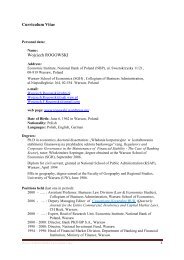EMERGING
Emerging Markets:
Emerging Markets:
Create successful ePaper yourself
Turn your PDF publications into a flip-book with our unique Google optimized e-Paper software.
<strong>EMERGING</strong> MARKETS:<br />
A Review of Business and Legal Issues<br />
in Connecticut, USA, and obtained the “root” passwords granting access to and control over<br />
an entire computer system, including the ability to manipulate, extract, and delete any and all<br />
data. Ivanov then threatened the corporation with the destruction of its computer systems, if<br />
they will not hire him as security expert. He was invited for the interview to the U.S. and after<br />
arrival was arrested on charges of conspiracy, computer fraud and related activity, extortion,<br />
and possession of unauthorized access devices. Ivanov argued that US court didn’t have<br />
subject matter jurisdiction over his conduct, because he was physically located in Russia at<br />
the time of the attacks. The court denied his arguments and asserted that Ivanov being<br />
physically outside United States territory at the time of actual perpetration intended to cause<br />
detrimental effects within the United States making it reasonable to apply to him a statute,<br />
which is not expressly extraterritorial in scope 1 . In this way US court confirmed objective<br />
territoriality principle over the computer crimes. However it is rather an exception than a rule<br />
that a country takes a cybercrime criminal into custody using its own powers or assistance of<br />
other states.<br />
The second basic model for resolving jurisdictional conflicts gives priority for<br />
nationality of the cybercriminal. This principle is based on the assumption that a person grants<br />
the country of which he is a national the right to regulate his conduct, no matter where<br />
located. In this way country adopting a proper criminal legislation can control and bring into<br />
custody its nationals for committing cybercrimes it other jurisdictions. This model seems to<br />
be effective, if a country where a cybercrime was committed and the country where<br />
detrimental effect took place doesn’t have a proper legislation in the question. Obviously<br />
countries are not restricted by the models for resolving jurisdictional conflicts stated above,<br />
and readily use other legitimate grounds for extraterritorial prosecutions, when it’s required<br />
by their national interests.<br />
International documents in this field also preserve a wide range of powers and<br />
obligations for cybercrime prosecutions. Council of Europe Convention on Cybercrime,<br />
1 United States v. Ivanov, 175 F. Supp. 2d 367, p. 1-15 (2000).<br />
Page 89 Volume 1, April 2009




